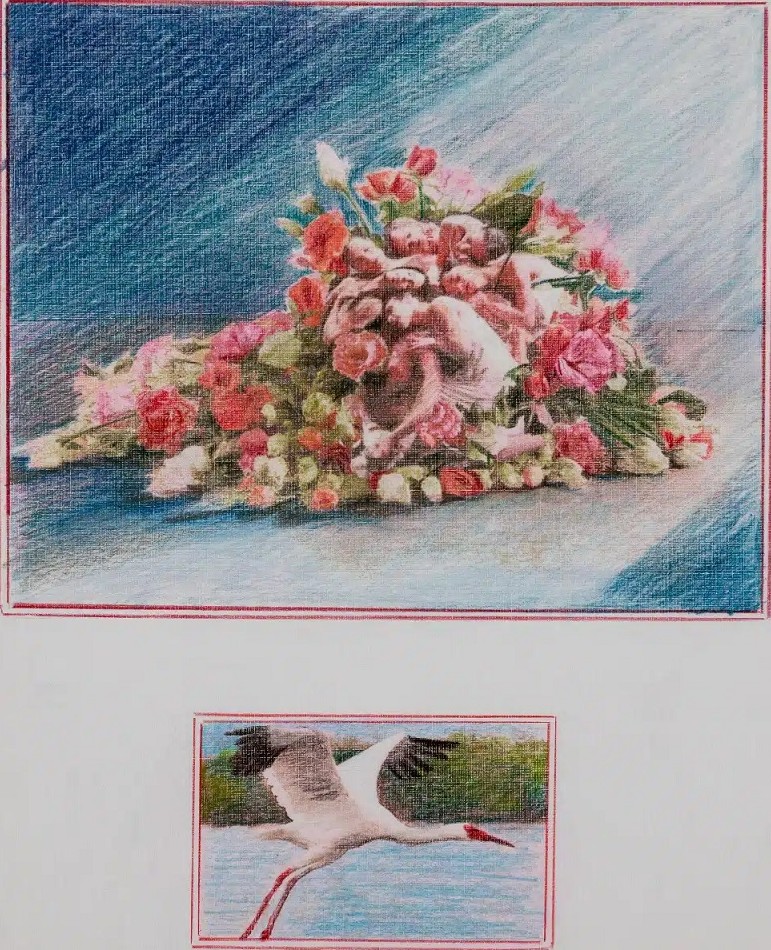London,
4 Cromwell Place, SW7 2JE,United Kingdom
12 April 2023 - 10 May 2023
Janet Rady Fine Art is presenting “Immortal Flowers”, our second solo show by Soudeh Davoud. Born in 1988, Davoud is a contemporary Iranian visual artist whose work explores the conventions of figurative painting while investigating the expressive possibilities of abstraction, in form and colour. Based in Iran, Davoud’s work contends with what it means to be a female artist in Iran today. In the past, having created works with a clear feminist bent, Davoud’s new body of work has inevitably developed in reaction to the continuing nationwide protests against the Iranian state following the death of Mahsa Amini in September 2022 at the hands of Iran’s morality police.
The works on paper quietly reflect the rage felt by Davoud at the war being waged against the rights of Iranian women. There are clear references made to protest and civil unrest in Davoud’s recent body of work, rewarded through close examination of the series “Immortal Flowers”.
The poster-sized works in “Immortal Flowers” depict surreal scenes within rectangular frames that embed symbols of Iran’s recent socio-political turmoil and protest into seemingly innocuous scenes such as floral still-lifes, city-scapes or landmarks of Iranian significance. Anonymous figures (often female) are piled haphazardly on top of each other, and other times arranged more formally in pyramidal compositions, emerging from the leaves of a flower within a still-life. The flexed and strained limbs of these figures exude a feeling of physical struggle, as they extend their reach outside of their disguised settings, as if trying to escape the four-sided composition they are concealed within. Beneath each of these larger scenes are smaller rectangular boxes that contain references to varying themes: hope, despair, childhood, innocence, bloodshed, civil unrest, death. With all of Davoud’s work in this series, at first glance we are faced with a gentle scene. Yet the closer we get, the more we look, the potent political subtext makes itself clear. In Bravery (2022) for instance, Davoud carefully conceals a severed dark braid beneath an arrangement of red and white flowers, rendered in reverence to the women who publicly chopped off their hair in an act of solidarity with Mahsa Amini. Similarly, Zahedan resistance (2022) is a powerful representation of the Great Mosque of Zahedan, shown with a river of blood streaming from its lower gates. This work is a potent tribute to the Zahedan Massacre, a series of violent crackdowns by the state against protestors that resulted in many deaths and casualties in 2022. The protests were the result of the rape of a 15-year old girl by the commander of the police force in Chabahar in June 2022. Though the poster-sized work reads at first glance as a magisterial depiction of a building that represents religious and moral authority, upon closer inspection it is a memorial to the terrible violence inflicted upon Iranians by the state.
Lastly, Unforgettable 742 (2022) plainly references the Ukrainian Airlines 752 Aeroplane that was shot down by the IRGC in 2020, killing all crew and passengers on board. The toy-plane is crashed into a floral arrangement set against a menthol-green background. Beneath this tableau is a child’s red ballet pump that starkly brings to the fore the egregious tragedy and loss of life caused by the state. Throughout the entire series of works, Davoud in no uncertain terms condemns the state and their acts of violence against the Iranian people. Davoud memorialises the lives lost and holds those responsible to account. Davoud has absorbed, digested and engaged the subjects, motifs and events that have consumed Iran since protests began in September 2022. While the country continues to stand at a perilous social and political crossroad, the works in “Immortal Flowers” respond to the trauma, tragedy, and anger that runs through contemporary Iranian society, while providing possibilities of hope for a better future. The multitudinous implications of flowers throughout the show; from purity and innocence to hardship, death and decay present Davoud’s view of where Iran stands plainly. “Immortal Flowers” leads us to consider the possible routes the country can take, while leaving us with an undying dream for change.
Text by Luli Gibbs
